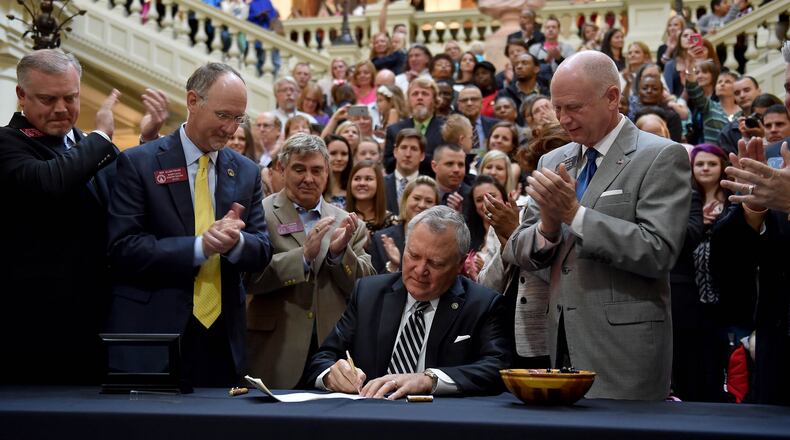It is possible to draw a line that links Georgia's new medicinal marijuana law with an effort by some of the most conservative lawmakers in the state Capitol to reassert their recently diminished influence.
But it will take some explaining on my part. And some patience on yours.
Thursday's signing ceremony for the medicinal pot bill, the final step for a highly improbable piece of legislation, was a giddy affair. A dozen afflicted children who might be helped by the cannabis oil, and their hard-charging parents, provided the joy.
The leaky waterworks came courtesy of Nathan Deal. It is a rare thing for a governor to shed tears of happiness over a bill not his own, but we have video to vouch for this.
Afterward, in a dry-eyed scrum with reporters, Deal confirmed that he had offered House Majority Leader Larry O’Neal a $142,000-a-year job as the sole judge for the Georgia Tax Tribunal.
O’Neal’s departure from the Legislature was not a surprise. The Bonaire Republican had led a revolt against the high price tag of House Bill 170, the transportation funding bill. O’Neal wanted to lower the proposed excise tax on gasoline so that his fellow GOP caucus members might escape the title of tax-increasers.
O’Neal’s effort failed, thanks to a combination of Republican and Democratic votes. Days later, Speaker David Ralston refused to name his majority leader to the House-Senate negotiating team that hammered out the final version of the state's $21 billion budget. In the Capitol, that is a snub of epic proportions.
Three candidates have already raised their hands as replacements for O’Neal: Jon Burns of Newington, in southeast Georgia; Chuck Martin of Alpharetta; and Allen Peake of Macon.
All three House Republicans supported O’Neal’s effort to trim back the transportation funding bill. Burns and Peake supported the final passage of HB 170. Martin did not.
Ralston, the House speaker, has sent word that it would be “premature” for him to make an endorsement in the race, which will be settled in mid-May. Ultimately, the low-key Burns is a likely candidate for the speaker’s support — as chairman of the House Game, Fish and Parks Committee, he’s considered a member of Ralston’s leadership team.
Martin is also a committee chairman, but the north Fulton lawmaker has a geographic handicap — given that the Capitol is already dominated, from the governor on down, by Republicans who hail from North Georgia.
Which brings us to Peake and that medicinal marijuana bill. As the author of HB 1, Peake was at the center of last week’s signing ceremony. Over the course of two years, the Macon lawmaker cajoled his fellow Republicans into supporting his unlikely cannabis measure, fighting off an army of Georgia prosecutors and sheriffs at the same time.
As a legislative effort, it was a tour de force, and Peake received a rare standing ovation after final House passage.
The success of the medicinal marijuana bill has raised Peake’s profile at a crucial moment. “He took the most controversial issue — not only in Georgia, but around the United States — and he ushers that to the floor with an overwhelming majority,” said state Rep. Micah Gravley, R-Douglasville, a Peake supporter. Just like real people, politicians admire a winner.
Gravley is also a member of the “Appeal to Heaven” segment of the House Republican caucus — a group of libertarian-minded, religious conservatives.
Gravley said Peake will get substantial support from the Appeal to Heaven group, whose members were strong backers of the religious liberty legislation that roiled the Capitol but failed to pass. Another of Peake's supporters, and a member of the Appeal to Heaven group, is state Rep. Sam Teasley, R-Marietta, who was a sponsor of a House religious liberty bill that never received a hearing. (Peake supported that legislation — though his gay brother testified against a Senate version.)
When Republicans first came to power in the House, they operated on the “Hastert rule” — named for former U.S. House Speaker Dennis Hastert. Only issues that obtained the approval of a majority of the House Republican caucus were brought to the floor — a policy that greatly enhanced the influence of hard-core conservatives.
HB 170, which split House Republicans, clearly didn’t follow the Hastert rule — much to the relief of Georgia’s business community. Call it a victory for moderation.
So the key question for the three men who would be majority leader, and why this election matters, is whether the Hastert rule should be reinforced. Here’s the answer that each candidate gave me:
Chuck Martin: "I'm not going to make it a rule for the caucus," he said. But as far as HB 170 is concerned, Martin said, "We didn't have enough discussion among the people who were not on board."
Jon Burns: "I think that the Georgia House and the Republican caucus are tasked with working for the benefit of all Georgians. Not just Republicans or not just Democrats," Burns said. "At times, I think it's proper — you make every effort — to consider initially the folks in your caucus. You make sure to listen, and you try to craft the legislation so that, if possible, it can be compatible with their viewpoints. But at the end of the day, we're tasked with representing all Georgians."
And Allen Peake: "I think it's important that we get a strong consensus, 91 votes, hopefully on any issue. That ought to be the way we govern," he said. "We have 119 members (in the caucus). There will probably be 10 or 15 at any given time that may disagree. We ought to be able to get 91 votes on any important piece of legislation."
And that’s what this race for House majority leader is all about.
About the Author
The Latest
Featured




